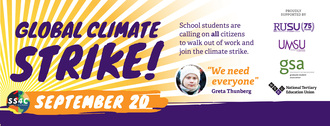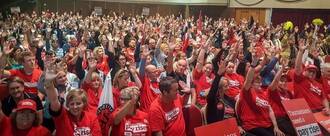- Featured
- Asylum Seekers and Migrants
- Climate and Environmental Justice
- Disability Justice
- Economic Justice
- Education
- First Nations Justice
- Health and Medicare
- International Solidarity
- LGBTIQA+ Rights
- Occupational Health and Safety
- Public Services
- Public Transport
- Racial Justice
- Social Justice
- Women's Rights
- Workers' Rights
- More
-
Allow ACT University Staff & Students to Attend Global Climate StrikeOn Friday September 20, school students around the world, alongside adults, will be participating in a Global Climate Strike – they will be marching to face the ongoing climate crisis, and to show the world’s political leaders that we will not idly stand by while they fail to act. We demand immediate action to avert otherwise inevitable catastrophe. In Australia, we are at a crossroads: the Government is fully aware of the need for serious solutions, but instead it would rather open up new projects to mine the earth of even more fossil fuels: Australia’s coal industry has already made us the world’s third-biggest emissions exporter. Internationally, the effects of climate change are already being felt in very real ways: this summer, Greenland’s ice sheet melted at rates scientists weren’t anticipating for another half-century, losing enough water in just five days this year to cover the ACT in over 9 metres of water. Our role as the University community is to educate and support the next generation who will continue to make this world a better, more equitable, fair, and just place than they found it. If our political leaders do not act now, this will not be possible – and as we already know: ‘There are no jobs on a dead planet.’ There’s also less water, more famine, more poverty, more extreme weather events, millions of displaced and suffering refugees, and likely, much more conflict. We have a responsibility to stand tall alongside the next generation in support of this important cause that will shape the world for hundreds of years to come, and to advocate for a rapid and just transition to renewables and a decarbonised economy. The Global Climate Strike is taking place three days before the UN Emergency Climate Summit, and is a strike in solidarity for those being impacted by the climate crisis now, and those who will be impacted in the future if we do not act: everyone from workers, first nations people, and young people, to those in parts of the world already suffering. High-profile businesses like Patagonia, Lush Cosmetics, and Ben & Jerry’s have already pledged that their workers will be joining the organised strikes in solidarity.277 of 300 SignaturesCreated by Jeremy S
-
La Trobe: Support for Global Climate Strike Sept 20Given our current trajectory towards devastating climate change, and the complacency of our national government, it is now crucial that public institutions like La Trobe University take the lead on this social justice and human rights crisis. We owe it to Indigenous people, who are already suffering from destruction and theft of country, lack of clean water and extreme weather. We owe it to all people, habitats and living creatures currently suffering from the impacts of climate change. We owe it to future generations. There is no more important social impact our university can make. The demands of the Climate Strike are urgent climate action, including: a transition to 100% renewable energy, no new coal or gas projects, and massive public investment in a just transition to a decarbonised economy; Indigenous people, fossil fuel workers, developing nations and all communities on the front line of the climate crisis must be prioritised in this transition. By declaring a stoppage of all activities on 20 September, La Trobe will be an international symbol for how we must act in response to our climate crisis.42 of 100 SignaturesCreated by NTEU Victoria
-
RMIT: Support for Global Climate Strike Sept 20Given our current trajectory towards devastating climate change, and the complacency of our national government, it is now crucial that public institutions like RMIT take the lead on this social justice and human rights crisis. We owe it to Indigenous people, who are already suffering from destruction and theft of country, lack of clean water and extreme weather. We owe it to all people, habitats and living creatures currently suffering from the impacts of climate change. We owe it to future generations. There is no more important social impact our university can make. The demands of the Climate Strike are urgent climate action, including: a transition to 100% renewable energy, no new coal or gas projects, and massive public investment in a just transition to a decarbonised economy; Indigenous people, fossil fuel workers, developing nations and all communities on the front line of the climate crisis must be prioritised in this transition. By declaring a stoppage of all activities on 20 September, RMIT will be an international symbol for how we must act in response to our climate crisis.312 of 400 SignaturesCreated by NTEU Victoria
-
Monash: Support for Global Climate Strike Sept 20Given our current trajectory towards devastating climate change, and the complacency of our national government, it is now crucial that public institutions like Monash University take the lead on this social justice and human rights crisis. We owe it to Indigenous people, who are already suffering from destruction and theft of country, lack of clean water and extreme weather. We owe it to all people, habitats and living creatures currently suffering from the impacts of climate change. We owe it to future generations. There is no more important social impact our university can make. The demands of the Climate Strike are urgent climate action, including: a transition to 100% renewable energy, no new coal or gas projects, and massive public investment in a just transition to a decarbonised economy; Indigenous people, fossil fuel workers, developing nations and all communities on the front line of the climate crisis must be prioritised in this transition. By declaring a stoppage of all activities on 20 September, Monash will be an international symbol for how we must act in response to our climate crisis.144 of 200 SignaturesCreated by NTEU Victoria
-
Pay superannuation to staff at Gumnut early learning in LithgowWorkers employed at Gumnut in Lithgow are gravely concerned about their workplace entitlements as ECEC Management has not been paying superannuation for up to a year for some workers. Workers at Gumnut are asking for their basic employment entitlements to be met. Will you sign?232 of 300 SignaturesCreated by Big Steps
-
Boycott the Detention IndustryCurrently, UNSW subcontracts it's security staff from MSS Security, a corporation involved in the illegal detention of refugees by the Australian Government. UNSW is also listed as a partner of Wilson Security (another culprit) and has accepted a grant to help the defence force to develop the Jindalee Operational Radar Network (JORN), a multi billion dollar satellite network that has been boasted as being able to track small boats carrying asylum seekers (an international human right). UNSW prides itself in being a progressive and humanitarian institution but uses students fees to invest in these torturous industries and staff and students won't take it any more, support the divestment by signing the petition!10 of 100 SignaturesCreated by James Morched
-
Support for global climate strike September 20The call from students organising the strike states: “Last year’s UN intergovernmental panel on climate change’s special report on global warming was clear about the unprecedented dangers of going beyond 1.5C of global heating. Emissions must drop rapidly – so that by the time we are in our mid- and late-20s we are living in a completely transformed world. But to change everything, we need everyone.” Already the NTEU, the GSA and UMSU who represent staff and students at the University of Melbourne, have endorsed this call to action. We will work together to ensure the widest possible stoppage of work and study so that staff and students can attend demonstrations on this historic day. The University of Melbourne has an opportunity to be a global leader on climate action – an opportunity that staff and students want the University to take. Climate change and climate action is a top concern within our university community for students and staff. As students and workers in the higher education sector, we have a particular responsibility and opportunity to campaign on climate action. Universities will play a leading role in the research and development and retraining that will be needed for the transition. Our fight against casualisation and the marketisation and commodification of education is inseparable from supporting our fellow workers and unionists in energy, transportation, and agricultural industries to decarbonise the economy and create dignified clean energy jobs. Transforming our destructive relationship with the environment requires a system change at all social, economic and political levels. To that end we stand with Indigenous people in struggles to protect their lands and waters from impending expansion of fossil fuel projects. We stand with workers in fossil fuel industries and their communities facing insecure work and an uncertain future. We stand against the vested corporate and political interests placing profits above the future of the planet. Students and staff call for the University of Melbourne to be bold on climate action and agree to stop work and class for all members of the university community to join the global climate strike on September 20th. There is no education on a dead planet.862 of 1,000 Signatures
-
Cancel TrimestersAfter a term of trimesters, it is clearer than ever that this change is detrimental to UNSW staff and students. Students cannot learn effectively under such tight time constraints, and our teachers are struggling with the increased workload. UNSW management should be more concerned with the wellbeing of its students and its workers than the size of their profits. We the undersigned call on UNSW Management to CANCEL TRIMESTERS.871 of 1,000 SignaturesCreated by UNSW Education Collective
-
Support Jobs for Graduate Engineers!Problem: There is huge pressure to deliver community infrastructure. Government needs adequate internal capacity but also needs industry to have the skills and staff to deliver the government’s projects. The engineering skills development process is broken. While government has lost capacity, the private sector often lives hand to mouth relying on winning projects and then headhunting to deliver on those projects. This model is not sustainable or desirable and inevitably leads to cost blowouts and delays. Solution: Government procurement is a major driver of economic activity. Procurement can also be used to drive better workforce development outcomes, by encouraging construction companies and consulting engineer firms to develop the next generation of engineers6 of 100 SignaturesCreated by Elliot D'Arcy
-
ScoMo's gotta go!Young people will inherit a dying planet because of government inaction on climate change. At the same time, investment in tertiary education is lower than it is in Trump's America, leaving students with increasing fees and debt. Young people also face an increasingly insecure and casualised workforce when we graduate. And our generation is the first to be worse off than our parents, with the cost of living and housing prices becoming untenable. Students on income support live way below the poverty line, and workplace exploitation of young people is rife. Scott Morrison's Liberal government has no vision for the future of young people. That's why we're telling Scott Morrison we'll be voting him and the Liberals out on May 18. NUS will be throwing parties in Sydney and Melbourne, and demonstrations in other cities across the country to call on young people to use their voice, and show ScoMo our power and young people and students come the election. Join us here: bit.ly/scomoparty539 of 600 SignaturesCreated by Desiree Cai, NUS President
-
Respect Tasmania's education staff and public service workersWe, members of the Independent Education Union, call on the Tasmanian Government to respect workers in public education and across the public sector in Tasmania. Proposals tabled by the Will Hodgman government so far do not adequately address the workload, pay and resourcing issues in Tasmanian public schools. Tasmanian teachers are the lowest paid in Australia, while Support Staff earn on average $25,000 a year and in some cases rely on Centrelink payments to make ends meet. Due to excessive workloads, almost half of teachers say they can’t meet the individual learning needs of students. Educator burnout is high and the best and brightest are being lost from the profession. We support members of the AEU and other public sector unions who in the face of their government’s failure to deliver a decent offer have been left with no option but to take stop work action on 2 and 3 April. Premier Hodgman, it’s time to show some respect for public sector workers, the backbone of Tasmania.291 of 300 SignaturesCreated by Independent Education Union Victoria Tasmania
-
Support Victorians with disabilities and the people who care for themIf employers continue to be bound by the current arrangements, they will soon be unable to continue delivering key services. We’ll see large-scale job-losses, loss of expertise, disruption of services to clients and a high potential for reduction in the quality of services. Without this support, Victoria’s disability sector will likely fail to retain the skilled and committed workers required under the NDIS, potentially resulting in widespread market failure across Victoria. We need to see an investment of $46 million over 3 years, to deliver the quality NDIS that people with disabilities so rightly demanded. This represents just 7 cents in every dollar that the Victorian government will contribute to the NDIS in a single year – but the impact will be huge.184 of 200 SignaturesCreated by Clare Neal









.png)


